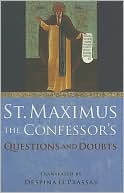

 |

|

Sold Out
Book Categories |
Maximus the Confessor (580–662) was a monk whose writings focused on ascetical interpretations of biblical and patristic works. For his refusal to accept the Monothelite position supported by Emperor Constans II, he was tried as a heretic, his right hand was cut off, and his tongue was cut out. A major theologian of the Byzantine Church, St. Maximus is venerated in both Eastern and Western Christian traditions. Despina Prassas’s translation of the Quaestiones et Dubia presents for the first time in English one of the Confessor’s most significant contributions to early Christian biblical interpretation. The original work is believed to have been written before 626 while the monk was a member of a community located near Constantinople. The text is a series of 239 interrogations and responses addressing theological, philosophical, ascetical, spiritual, and liturgical concerns. In his work, Maximus the Confessor brings together the patristic exegetical aporiai tradition and the spiritual-pedagogical tradition of monastic questions and responses. The overarching theme is the importance of the ascetical life. For Maximus, askesis is a lifelong endeavor that consists of the struggle and discipline to maintain control over the passions. One engages in the ascetical life by taking part in both theoria (contemplation) and praxis (action). To convey this teaching, Maximus uses a number of pedagogical tools including allegory, etymology, number symbolism, and military terminology. Prassas provides a rich historical and contextual background in her introduction to help ground and familiarize the reader with this work. As the first study focused exclusively on the Quaestiones et dubia, this important book will appeal to the growing audience of readers interested in Maximus the Confessor and, more broadly, to scholars and students of early Christianity, early Byzantine monasticism, and patristic biblical exegesis.
Login|Complaints|Blog|Games|Digital Media|Souls|Obituary|Contact Us|FAQ
CAN'T FIND WHAT YOU'RE LOOKING FOR? CLICK HERE!!! X
 You must be logged in to add to WishlistX
 This item is in your Wish ListX
 This item is in your CollectionSt. Maximus The Confessor's Questions & Doubts
X
 This Item is in Your InventorySt. Maximus The Confessor's Questions & Doubts
X
 You must be logged in to review the productsX
 X
 X

Add St. Maximus The Confessor's Questions & Doubts, , St. Maximus The Confessor's Questions & Doubts to the inventory that you are selling on WonderClubX
 X

Add St. Maximus The Confessor's Questions & Doubts, , St. Maximus The Confessor's Questions & Doubts to your collection on WonderClub |